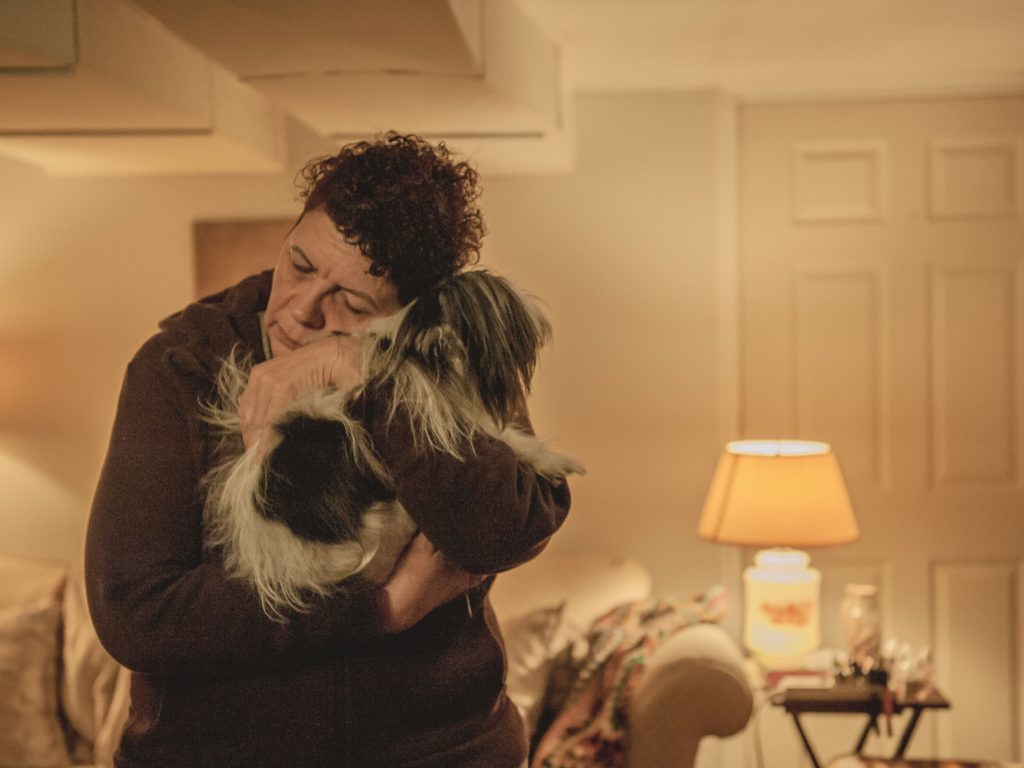“Murmur” is director Heather Young’s first feature. Her 2016 short “Fish” has played at festivals around the world. It won Best Short Film in the NSI Online Short Film Festival, and was a Vimeo Staff Pick. Young’s next short film, “Milk,” debuted at the 2017 Toronto International Film Festival.
“Murmur” will premiere at the 2019 Toronto International Film Festival on September 6.
W&H: Describe the film for us in your own words.
HY: “Murmur” is a docu-fiction hybrid film that tells the story of Donna (Shan MacDonald), an older woman convicted of a DUI, who is forced to do community service at an animal shelter. In an acute state of loneliness, she turns to the animals for companionship. She begins acquiring more and more pets in a futile attempt to fill the void, becoming a budding animal hoarder in the process.
The film combines a documentary-like realism — through using non-professional actors, non-scripted dialogue, and real locations — with a formal and contemplative cinematic language.
W&H: What drew you to this story?
HY: I began to develop the idea for “Murmur” after completing the short film “Howard and Jean” in 2014, which was a documentary/fiction hybrid about my mother and her relationship with her elderly chihuahua. That short film told a quiet story of an older woman who begins to experience severe anxiety and isolates herself inside her small basement apartment. With no one else to turn to, she relies on the constant companionship of her small dog for her comfort and social outlet.
After that film, I began to ask myself what if this idea was taken further, and expanded to its most extreme outcome? From there I began to develop the story of a woman who has made mistakes in her life that have severed her connections to family and friends, and in an acute state of loneliness, she turns to animals for companionship.
I also drew on my experience working in an animal shelter and a doggy daycare to create a visceral and distinctive work environment for my character.
W&H: What do you want people to think about when they are leaving the theater?
HY: I hope when people leave the theater they feel a deep empathy and understanding for Donna, our main character in the film. And I hope that they acknowledge that they went on this emotional journey with an older female character, which is an unusual and underrepresented protagonist in cinema.
W&H: What was the biggest challenge in making the film?
HY: One of the challenges that we faced during our production was filming with a large number of animals. There is an old saying in the film industry, “Never work with children or animals.” And there is a reason for that, as there is no way to make animals do what you want them to do, when you want them to do it.
However, what made it a challenge — the unpredictability of the animals — was also a strength, as the animals gave the scenes a life and energy that they wouldn’t have had otherwise.
W&H: How did you get your film funded? Share some insights into how you got the film made.
HY: Our film was funded by the Telefilm Canada Talent To Watch program, the Canada Council for the Arts, the Government of Nova Scotia’s Film and Television Production Incentive Fund, and Arts Nova Scotia.
W&H: What inspired you to become a filmmaker?
HY: When I was younger I discovered that filmmaking combined a lot of different art forms into one — including two of my favorites, writing and photography — and I found that very satisfying. This was part of what made me want to choose filmmaking over other art forms. Also, feeling connected, engaged, and inspired by watching lots of films made me want to make my own.
W&H: What advice do you have for other female directors?
HY: My advice for other female directors is to try not to care too much what other people think about your work. Try to make your work first and foremost for yourself because you want to do it.
Also, remember that you don’t always have to wait for money to make a film. I made several short films — by myself, with no budget — and I found that very liberating.
W&H: Name your favorite woman-directed film and why.
HY: “Jeanne Dielman, 23, Quai du Commerce, 1080 Bruxelles,” directed by Chantal Akerman. This film changed my idea of what it is possible to do in cinema. It is bold and wildly unique. I’ve never seen anything else quite like it.
The carefully composed images build tension throughout the duration, elevating the smallest gesture into a dramatic moment. This film made me feel like in cinema, anything is possible.
W&H: What differences have you noticed in the industry since the #MeToo and #TimesUp movements launched?
HY: One of the things I have noticed is that film festivals, funding programs, and development programs are finally taking notice and talking about gender representation within their programming. Having institutions making changes to work towards 50/50 gender parity is a huge step in the right direction that is long overdue.







